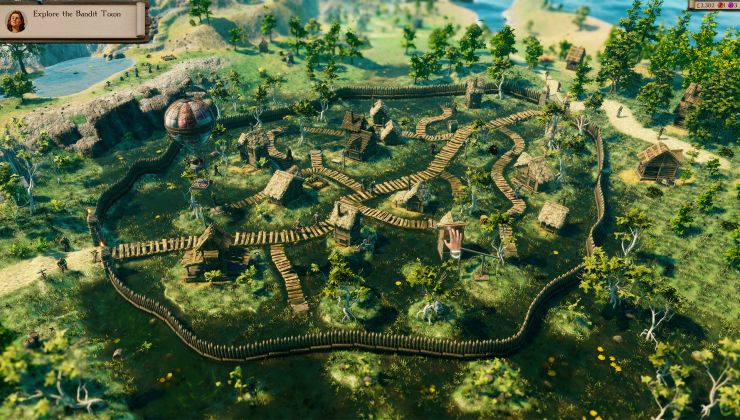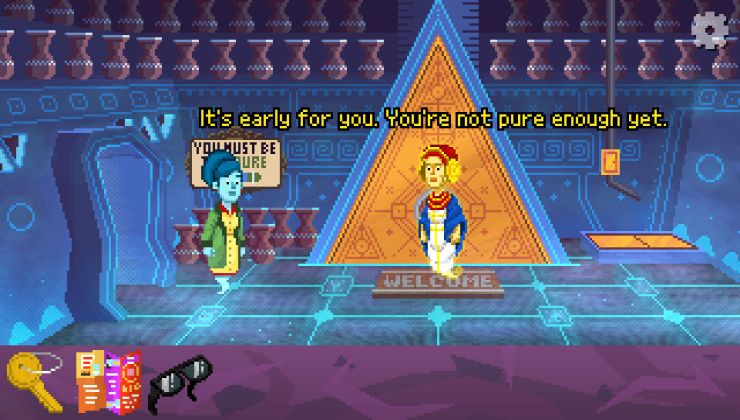Here's one for serious Valve enthusiasts and people wanting to get juice details on their cancelled projects, and everything that led up to Half-Life: Alyx.
Half-Life: Alyx - Final Hours is an interactive storybook, written by Geoff Keighley, that takes fans inside Valve Software to chronicle the company’s past decade of game development, including the return of Half-Life. There's so much detail in there it's crazy, it's also pretty amazing to learn it all with this new Valve Software that doesn't seem to mind talking a bit more. If you're curious, that does include a cancelled Half-Life 3. Yes, it really actually was a thing (as if there was any doubt) but it along with a lot more didn't make the cut.

Direct Link
As for all the projects mentioned that got canned, I won't go over them all in-depth because that spoils a lot of the fun but there's a few big obvious ones like Half-Life 3, that no doubt fans will be sad to learn of its fate. Unlike previous games, it sounded quite different with plans to be more replayable with some random generation, taking some inspiration from Left 4 Dead. Left 4 Dead 3 was also going to be a thing, in a more open world setting. Both games didn't get too far, sounds like Source 2 wasn't in a good state. Other Half-Life themed games and Left 4 Dead attempts were also mentioned, like one involving a time-travelling ship. There was even going to be an RPG, a voxel-based destruction game and a VR game made with original Kerbal Space Program developers.
Hilariously, Vader was the name of their first attempt at a VR headset with an estimated eye-watering $5K price tag that was clearly far too ambitious.
The good news is, Valve don't sound done with Half-Life and that they're "not afraid of Half-Life no more" and future projects might even be outside of VR for the rest of us. Nothing confirmed there though. Other better news perhaps, is that another major "top secret" project is under way and has been since 2018 but no idea what it is.
You can find Half-Life: Alyx - Final Hours on Steam for £7.19 / $9.99 / €8.19. It doesn't officially support Linux but it's possible to run it with the Steam Play Proton compatibility layer. You may need the community made Proton GE though.
Quoting: HoriI too believe that flatscreen games and VR games need to coexist, and I'm sure without a doubt that this will be the case.Oh yeah so do I. absolutely. It almost goes without saying. But I firmly believe they can also make RTS fully work - did you check the VR RTS game Patola mentioned earlier?
But look at us now! This is fantastic. I am thrilled about our current status quo! Think about it: Now we talk about if flat-screen games will still exist. It was NOT long ago (a few months!) we rather discussed if VR were here to stay or not!
Quoting: PatolaNo, it's not. Just like "strategic voting" is actually, and very specifically, tactical voting--when you vote "strategically" you are actually making the decision that in the particular case, the strategy of gradually building the electoral movement you prefer is outweighed by the tactical issue of the outcome of the current election. Mistaken terminology is common. And doubly common in game genre naming.Quoting: Purple Library GuyLet me just stop you right there. I like some RTS. I spent a good deal of time back in the day playing original Starcraft; it's fun. But, despite the word being in there, they are not strategy games, they are tactical action games. My claim does not apply to them. I am perfectly capable of imagining ways in which VR could be applied entertainingly to RTS games.So, Real-Time Strategy is not Strategy?
The point is, strategic games are in the end largely about abstraction and ratiocination. If you need reflexes to win, it's not a strategy game. (That is of course not a sufficient condition--there are lots of kinds of games that don't need reflexes to win)
At a basic level, it's unlikely that VR will do much for them in the same sense that it's unlikely VR will do much for crossword puzzles. VR is useful for immersion in a reality. Strategy games are not about immersion in a reality. Strategy games fundamentally need to present interesting mental challenges. At the UI level, what they need to do is arrange things so you can easily see the nature of those challenges and spend not too much of your time doing things unrelated to them, like moving between different UI bits or repetitive micro-managing, while still preserving the mental challenge itself rather than glossing over it too much. The main goal is not for the UI to be immersive, but to be clean.
Sure, a bit of glitter doesn't hurt, some feedback when you accomplish something and so on. And yes, VR can provide glitter. But basically, virtual reality is not fundamentally oriented towards doing things that strategy games need--contrast, say, first person combat where VR is thoroughly and obviously oriented towards doing exactly what it needs. There's a continuum; some genres are clearly drastically improved by VR, some can be improved by VR a fair amount, and some can be improved by VR very little.
Quoting: PatolaNo, not at all. First, let's look at this statement: "nobody ever does anything else but use the limits of their own imagination" does not inform anything about something being true or false -- it's a fallacy (Argumentum ad Populum). Bad habits used by the majority of people do not justify their use by you in a debate. And that is the same thing with using the lack of imagination as an argument -- it's another registered fallacy, with latin name, wikipedia page and all: [Argumentum ad Ignorantiam](https://en.wikipedia.org/wiki/Argument_from_ignorance). What that means is that you can't use it to logically advance a point, because there is no relation of implication.I suppose I was using the term "imagination" rather broadly, since after all you were projecting it onto me when I hadn't actually used the word. But you're missing the point. It doesn't matter how nice it would be to base arguments on things we can't even imagine, that's impossible to do. People are limited by the limits of their imagination. That certainly includes you--no matter how much you complain about the notion of only describing, arguing about, or otherwise discussing what one can imagine, that is all you are, or ever can be, doing. If you can't conceptualize it in some way, you can't talk about it. It's useless to complain that my partaking in the human condition is poor argumentative form; when you yourself become God you can put me down for it.
Granted, you can talk about things you can't imagine very well--but even deliberate contradictions can be imagined, you imagine this sort of fugue state, some kind of weird rapid unstable alternation between is and is-not.
Quoting: PatolaSo you're saying you're arguing with me even though you have no idea whether I'm right. But the thing is I'm precisely saying strategy is a genre which is basically unrelated to VR-ness--thus VR really enhancing a strategy game would be "randomly making very unrelated things work together".Quoting: Purple Library GuyThat's all very fine, but not every tool is suited to every job. Just by the by, I also can't imagine how someone could use Microsoft Bob to improve strategy games, nor do I think a really good IDE for the computer language R would improve strategy games much. There may be smart and creative people out there who could show me for the foolish philistine I am on these topics; I am satisfied to remain deluded until they actually make a great strategy game incorporating an IDE for R.Creativity/innovation does not mean randomly making very unrelated things work together -- although some times it does just that, and these examples outshine others because of their excentricity. Your example just show some directions which have very low likelihood of working, and I could similarly cite a few directions which have some high likelihood of working, but in the end, you can't forecast the innovation.
Quoting: PatolaHalf of what you've been saying is claims about stuff being fundamentally unknowable, and then you turn around and complain when I fail to evince perfect certainty. Fine, let me rephrase: I strongly suspect that such things would just be distractions. Happier?Quoting: Purple Library GuySo for instance, with VR it would be easier to do a 4X space game with a genuine three dimensional galaxy, where you'd walk around the stars and stuff. But what I'm not at all sure of is whether that would actually make it a better game or if it would just be a distraction from the decisions that make strategy games interesting.Yeah, you're not sure, and this is formally a pseudo-argument.
Quoting: PatolaThanks.Quoting: subI'm still struggling with VR. :/Do you play standing or seated? I've found that a great part of the reason of my VR fatigue comes from prolonged standing, even though in the end it feels like headaches and sickness just like you. Take caution that this is [very bad for your health](https://www.ncbi.nlm.nih.gov/pmc/articles/PMC4591921/). I've partially solved the problem by buying and using a [saddle stool](https://www.google.com/search?q=saddle+stool&client=ubuntu&hs=6pc&channel=fs&sxsrf=ALeKk00CWlulW9cq3M0y0FCwWO8n_D5CyA:1594629910211&tbm=isch&source=iu&ictx=1&fir=nn9HlWCDI7Cb2M%252C1cUPYGRqpZYaWM%252C_&vet=1&usg=AI4_-kTUOdTr2IhbJl7cOOFe9jG9tP8mBg&sa=X&ved=2ahUKEwimm-Kq68nqAhXRk4sKHct0CZIQ9QEwAXoECAoQMw&biw=1230&bih=917#imgrc=nn9HlWCDI7Cb2M), which allows you to use a somewhat standing position, still be mobile and not get easily tired. It has a few immersion-breaking moments like when you want to duck (you have to briefly leave the stool) but it's tolerable. That is the best affordable solution I've found until [VR harnesses and treadmills](https://www.roadtovr.com/katvr-kickstarter-kat-walk-c/) are mass-produced.
Alyx as a game and the immersion IS AMAZING.
Yet, even with getting somehow used to the Index and not facing
heavy motion sickness anymore, I can only use it for about 30 mins at max.
This is always so exhausting (for me) ending in headaches and at least slight sickness. :/
If you found my tips useful, please use them with Linux, not Windows.
The the saddle stool might be good idea, indeed.
I'm standing. Always.
Tbh, so far I have not crossed a game that supports seated playing.
Which ones are you using?
Quoting: subI'm standing. Always.I think the trick is that the game assumes you're standing...
Tbh, so far I have not crossed a game that supports seated playing.
Which ones are you using?







 How to setup OpenMW for modern Morrowind on Linux / SteamOS and Steam Deck
How to setup OpenMW for modern Morrowind on Linux / SteamOS and Steam Deck How to install Hollow Knight: Silksong mods on Linux, SteamOS and Steam Deck
How to install Hollow Knight: Silksong mods on Linux, SteamOS and Steam Deck